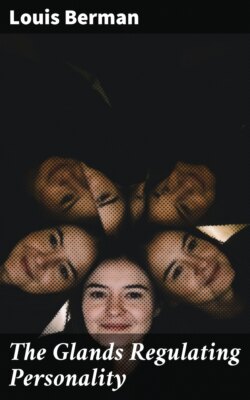Читать книгу The Glands Regulating Personality - Louis Berman - Страница 5
На сайте Литреса книга снята с продажи.
ATTITUDES TOWARD HUMAN NATURE THE CASE AGAINST HUMAN NATURE
ОглавлениеMan, know thyself, said the old Greek philosopher. Man perforce has taken that advice to heart. His life-long interest is his own species. In the cradle he begins to collect observations on the nature of the queer beings about him. As he grows, the research continues, amplifies, broadens. Wisdom he measures by the devastating accuracy of the data he accumulates. When he declares he knows human nature, consciously cynical maturity speaks. Doctor of human nature—every man feels himself entitled to that degree from the university of disillusioning experience. In defense of his claim, only the limitations of his articulate faculty will curb the vehemence of his indictment of his fellows.
For all history provides the material, literature the critique, biology the inexorable logic of the case against human nature. The historical record is a spectacle of man destroying man, a collection of chapters on man's increasing cruelty to man. Limitations of time and space have been shortened and eliminated. Tools of production have been multiplied and complicated. The sources of energy and power have been systematically attacked and trapped. But the nature of man has remained so unchanged that clap trap about progress is easy target for the barrage of every cheap pamphleteer.
The naturalist probes into codes of conduct, systems of morality, structures of societies, variations in the scales of value that individuals, races and nations have subjected themselves to as custom, law and religion. Again and again the portrait is presented of man preying upon man, of cunning a parasite upon stupidity and of predatory strength enslaving the weakling intellect. Until finally are evoked reactions and consequences that overtake in catastrophe and cataclysm preyer and preyed upon alike.
Human nature is but part of the magnificent tree of beast nature. Man is linked by every tie of blood and bone and cell memories with his brethren of the sea, the jungle, the forest and the fields. The beast is a seeker of freedom, but a seeker for his own ego alone, and the satisfaction of his own instincts only. Thus he struggles to a sort of freedom which makes him the Ishmael of the Universe, everyone's hand against him, as his own hand is against everyone. The human animal has achieved no advance beyond the necessities of his ancestors, nor freed himself from his bondage to their instincts and automatic reflexes. And so the sociologist, the analyst of human associations, turns out to be simply the historian and accountant of slaveries.
Yet the history of mankind is, too, a long research into the nature of the machinery of freedom. All recorded history, indeed, is but the documentation of that research. Viewed thus, customs, laws, institutions, sciences, arts, codes of morality and honor, systems of life, become inventions, come upon, tried out, standardized, established until scrapped in everlasting search for more and more perfect means of freeing body and soul from their congenital thralldom to a host of innumerable masters. Indeed, the history of all life, vegetable and animal, of bacillus, elephant, orchid, gorilla, as well as of man is the history of a searching for freedom.
Freedom! What to a living creature is freedom? How completely has it dominated the life history of every creature that ever crawled upon the earth? Trace our cellular pedigree, descend our family tree to its rootlets, our amebic ancestors, and the craving for more freedom is manifest in the soul of even the lowest, buried in darkness and slime. When the first clever bit of colloidal ooze, protoplasm as the ameba, protruded a bit of itself as a pseudopod, it achieved a new freedom. For, accidentally or deliberately, it created for itself a new power—the ability to go directly for food in its environment, instead of waiting, patiently, passively, as the plant does, for food to just happen along. Therewith developed in place of the previous quietist pacifist, quaker attitude toward its surroundings, a new religion, a new tone: aggressive, predatory, careerist.
That adventure was a great step forward for the ameba—a miracle that freed it forever from the danger of death by starvation. But latent in that move were all the terrible possibilities of the tiger, the alligator, the wolf and all the varieties of predaceous beast and plant, parasitism and slavery. The device that enabled the ameba to change its position in space of its own will, and so increased its freedom immeasureably, meant the generation of infinite evil, pain, suffering and degradation for billions in the womb of time.
